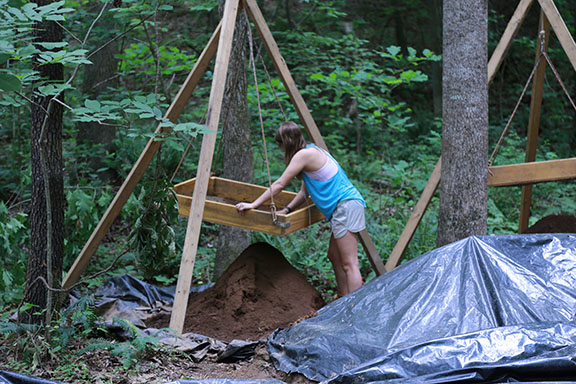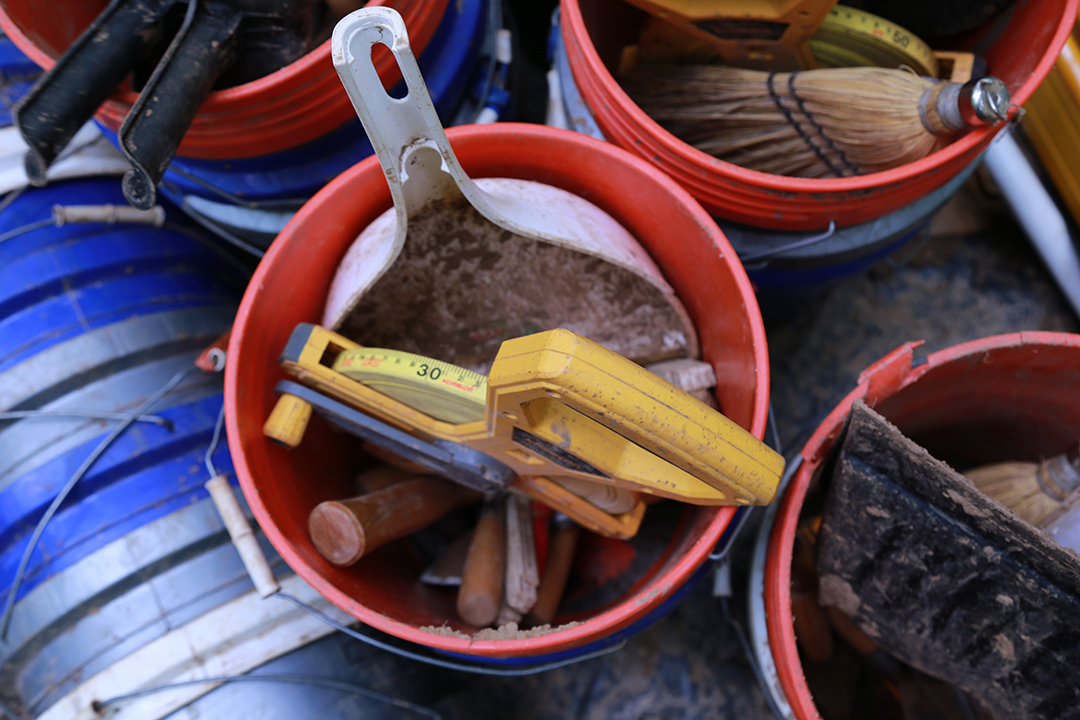[video:https://youtu.be/NaOYziWKZiI autoplay:0]
The Field School (technically known as the Rhodes College Maymester in Environmental Archaeology) is located at Ames Plantation, just 50 miles from Memphis. Encompassing 20,000 acres and at least 250 known historical sites, the plantation is the perfect spot for archaeological, biological, and environmental research. With no previous experience necessary, the study offers students the chance to get their hands dirty—literally, as a major component is an actual dig. Lead faculty member Dr. Kimberly Kasper, department of anthropology and sociology, says the course allows students to get the best of both worlds in academic and physical experience. “We are in the field digging every morning, and in the afternoons the students catalog their finds and learn from guest lecturers sharing their expertise.”
For the past two years, the Rhodes group has excavated the slave cabins and manor house of Fanny Dickins, a woman who owned and ran her own plantation, a rarity for the time. Though students’ days on the plantation were uniformly structured, each day’s dig came with surprises, and every lecture and lab was unique and interesting, says Regan Adolph '16. “We studied tree ring growth and charcoal wood samples, looked at microscopic pollen seeds, gathered clay to make our own pots, gathered wild foodstuffs, and toasted them over a fire. On the weekends, we took field trips to other archaeology sites and Native American mounds, as well as to a pig roast on the nearby farm of one of the professors. My favorite thing was just being on the plantation after a satisfying workday in the field—spotting cows, horses, and rabbits, and finding pretty spots to journal.”
The curriculum is designed to have a more modern component as well, teaching the students to connect the dots between past events and current situations. Claire Norton ’17 says she has a clearer understanding of how food inequities in the Mid-South are tied to the agricultural practices of the 1800s, for example.

“Gaining perspective on how inequalities are carried across time has greatly broadened my understanding. Relevancy is brought to the discipline of archaeology through unpacking the history behind our current culture in a way that sheds light on practices ingrained in society today,” she explains.
The Field School offers an opportunity to earn four credits in history and/or science outside the traditional classroom setting. As a history major with plans to pursue graduate studies in the fall of 2017, Adolph felt the course was a perfect fit for her science requirement. Norton, of Texarkana, TX, is an anthropology and sociology major with a minor in environmental studies and archaeology. Before she joined the 2015 Field School, she was hired as a research assistant in the archaeology lab. As much of her research was tied to the plantation, she found the immersive environment very helpful in understanding the history and events that occurred there. And, adds Norton, “Actually engaging with these culturally influenced sites at Ames Plantation is a lot more exciting than just reading about them.”

Last summer, the team found a second house on the property, followed by the discovery of a rich organic layer on the second to last day of the dig. “We are not sure what it is—it could be a root cellar or the floor of a house,” says Kasper. “It was really hard to wait until this year to find out more!” This year, the dig site rendered numerous items considered household artifacts such as a knife, pipes, and beads.
Memphian Ethan Williford ’17 was a part of the dig for the first time in 2016 and, prior to participating, looked forward with anticipation: “As a history major, I constantly come into contact with archaeological sources, but have never fully understood the processes necessary for attaining them. I am glad to finally learn the methodology and techniques of archaeology. I’m sure the Field School will be a wonderful experience that will provide lasting memories, and I know this opportunity and others like it will help me when I search for a job or post-graduate education.”
* * *
Story excerpted from "Summertime . . . and the Livin' is Busy!", Rhodes Magazine, Summer 2016